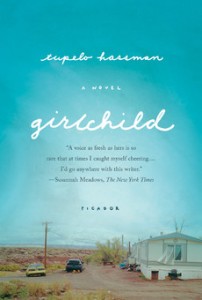Girlchild by Tupelo Hassman
 Girlchild
Girlchild
by Tupelo Hassman
Picador, Feb 2013
288 pages / $15 Buy from Amazon
Rory Dawn, the screaming sunrise, is third generation in a line of women who grew up too soon, and grew up to grinding poverty. She lives with her mother in a trailer park outside of Reno called the Calle. The Calle is a dumping ground for all the usual white trash suspects: drinking and gambling and smoking and teen pregnancy. There is also plenty of literal garbage (popsicle sticks, beer cans, homework assignments) swirling around in the Nevada dust. The kind of place where people regularly have to choose between paying the water bill to keep the toilet running, or buying a tank of propane to keep the heat going.
Rory’s mother, Jo, tends bar when she’s not sidled up to one. She lost her teeth young, and Rory’s greatest joy in life is seeing her smile wide, without her hand hiding her dentures. Rory’s grandmother lives in the trailer down the way, and spends her time gambling, knitting, and trying to make things grow in the harsh dirt. Both women want nothing more than for Rory Dawn than to grow up and “get out,” without making the mistakes they did. Neither has the first idea how to help her achieve this goal.
Growing up is a dangerous journey for Rory. At school, she performs off the charts on standardized tests, and scrawls “I hate Rory Dawn” on the bathroom wall. On the Calle, predators like the Hardware Man won’t even wait until a girl like Rory starts to fill out.
Girlchild works hard to rid us of any notion that the point of the story is whether or not Rory will “get out.” Calle life is a circle, and it’s impossible to draw the line where the past meets the future. They call poverty a vicious cycle, after all. To this end, Girlchild is told in a disjointed, highly metaphorical narrative, jumping around among all the most mundane and most heartbreaking moments of Rory’s childhood. Much of the story is in 1-3 page mixed genre vignettes, many of them sad and clever, like the word problems that make no sense and have no real answers.
August 5th, 2013 / 11:00 am
